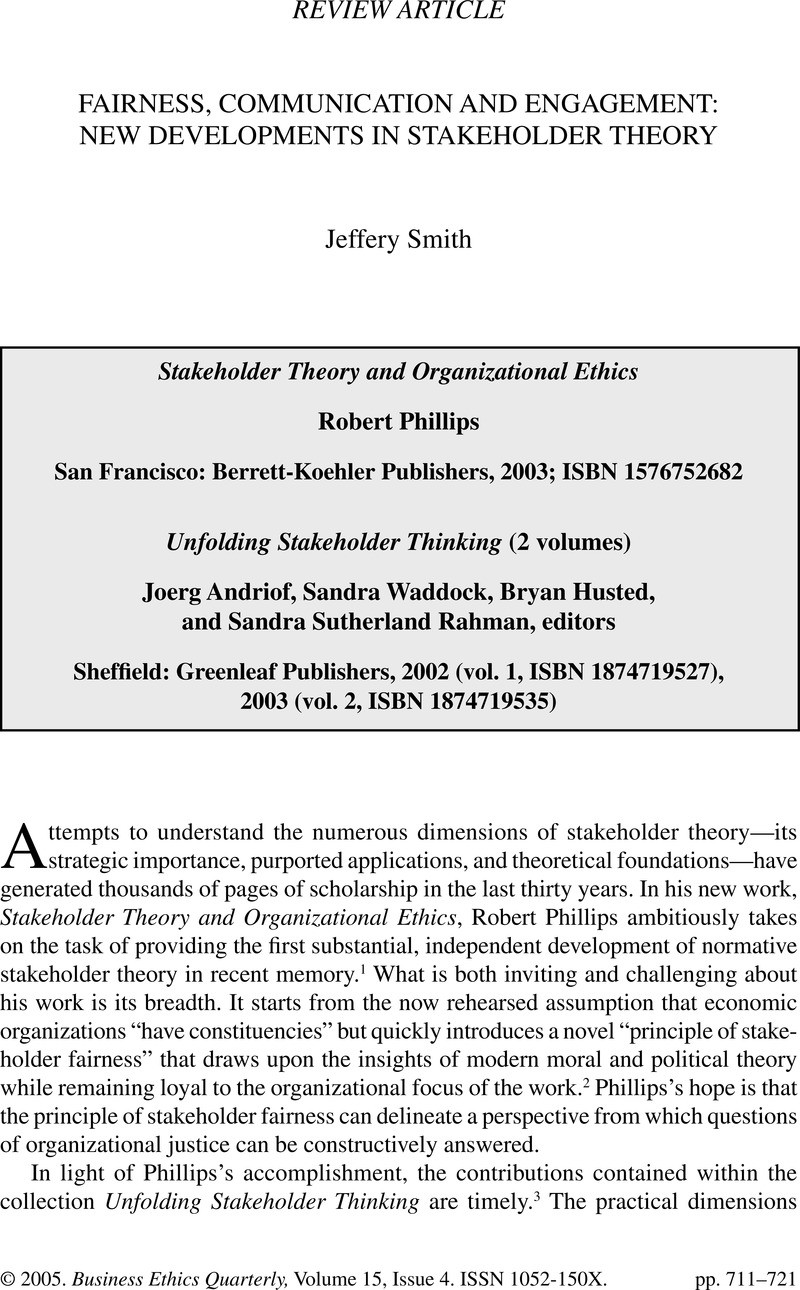Published online by Cambridge University Press: 23 January 2015

1. Robert Phillips, Stakeholder Theory and Organizational Ethics (San Francisco: Berrett-Koehler Publishers, 2003).
2. Ibid., 3–10.
3. Joerg Andriof, Sandra Waddock, Bryan Husted, and Sandra Sutherland Rahman, eds., Unfolding Stakeholder Thinking, 2 vols. (Sheffield: Greenleaf Publishing, 2002 and 2003).
4. Kenneth Goodpaster, “Business Ethics and Stakeholder Analysis,” in Ethical Theory and Business, ed. Norman Bowie and Tom Beauchamp (Upper Saddle River, N.J.: Prentice Hall, 1993), 91.
5. See, for example, John Boatright, “Ethics and Corporate Governance: Justifying the Role of the Shareholder,” in The Blackwell Guide to Business Ethics, ed. Norman Bowie (Malden, Mass.: Blackwell Publishers, 2002), 38–60; Alexei Marcoux, “A Fiduciary Argument Against Stakeholder Theory,” Business Ethics Quarterly 13 (2003): 1–24.
6. Marcoux, “A Fiduciary Argument Against Stakeholder Theory,” 5.
7. Michael Jensen, “Value Maximization, Stakeholder Theory, and the Corporate Objective Function,” in Theory, Responsibility, and Engagement, vol. 1 of Unfolding Stakeholder Thinking, 66.
8. Phillips, Stakeholder Theory and Organizational Ethics, 74.
9. Ibid., 76.
10. Ibid., 77. Cf. Richard Marens and Andrew Wicks, “Getting Real: Stakeholder Theory, Managerial Practice, and the General Irrelevance of Fiduciary Duties Owed to Shareholders,” Business Ethics Quarterly 9 (1999): 273–94.
11. Kenneth Goodpaster, T. Dean Maines, and Michelle Rovang, “Stakeholder Thinking: Beyond Paradox to Practicality,” in Unfolding Stakeholder Thinking, vol. 1, 43–63.
12. Ibid., 44.
13. Ibid., 47.
14. Phillips, Stakeholder Theory and Organizational Ethics, 49.
15. Ibid., 48; Jensen, “Value Maximization, Stakeholder Theory and the Corporate Objective Function,” 65–67.
16. Phillips, Stakeholder Theory and Organizational Ethics, 162.
17. Equitability should not be confused with equal treatment or equal consideration in the sense that all stakeholders receive the same level of moral concern. Phillips is clear that equitability is a norm of proportional moral concern; that is, distributing the benefits and burdens of organizational life should be a function of the contributions, costs, and risks borne by each stakeholder. Ibid., 27.
18. Ibid., 92.
19. Ibid., 99.
20. Ibid., 105–06.
21. Ibid., 103.
22. Juergen Habermas, Moral Consciousness and Communicative Action, trans. Christian Lenhardt and Shierry Weber Nicholson (Cambridge, Mass.: MIT Press, 1996), 93.
23. Alexei Marcoux, “Balancing Act,” in Contemporary Issues in Business Ethics, ed. Joseph DesJardins and John McCall (Stamford: Wadsworth, 2000), 92–100; Robert Phillips, “Remarks on Marcoux: Defending Stakeholder Theory,” in Contemporary Issues in Business Ethics, ed. DesJardins and McCall, 100–02.
24. Habermas, Moral Consciousness and Communicative Action, 120.
25. See Christopher McMahon, “Discourse and Morality,” Ethics 110 (2000): 514–36.
26. Jem Bendell, “Talking for Change? Reflections on Effective Stakeholder Dialogue,” in Relationships, Communication, Reporting and Performance, vol. 2 of Unfolding Stakeholder Thinking, 69.
27. Andrew Crane and Sharon Livesey, “Are You Talking to Me? Stakeholder Communication and the Risks and Rewards of Dialogue,” in Unfolding Stakeholder Thinking, vol. 2, 48.
28. Julia Robbins, “Stakeholders and Conflict Management: Corporate Perspectives on Collaborative Approaches,” in Unfolding Stakeholder Thinking, vol. 2, 173–79.
29. Michael Johnson-Cramer, Shawn Berman, and James Post, “Re-Examining the Concept of ‘Stakeholder Management,’” in Unfolding Stakeholder Thinking, vol. 2, 155.
30. Phillips, Stakeholder Theory and Organizational Ethics, 162.
31. See T. M. Jones, “Instrumental Stakeholder Theory: A Synthesis of Ethics and Economics,” Academy of Management Review 20 (1995): 404–37.
32. Phillips, Stakeholder Theory and Organizational Ethics, 162.
33. Johnson-Cramer, Berman, and Post, “Re-Examining the Concept of ‘Stakeholder Management,” 158.
34. Phillips, Stakeholder Theory and Organizational Ethics, 162.
35. Ibid., 123–30.
36. Duane Windsor, “Jensen’s Approach to Stakeholder Theory,” in Unfolding Stakeholder Thinking, vol. 1, 100.
37. See Thomas Donaldson and L. E. Preston, “The Stakeholder Theory of the Corporation: Concepts, Evidence, and Implications,” Academy of Management Review 20 (1995): 65–91.